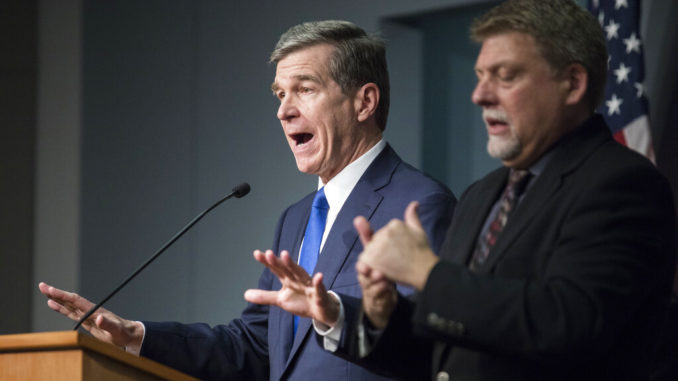
ALBEMARLE –– On Saturday afternoon, North Carolina Gov. Roy Cooper used an executive order to close all public schools statewide for two weeks and halt all mass gatherings of more than 100 people.
The school closure mandate will extend through March 27 in an attempt to lessen the impact and spread of the coronavirus, which now has 3,777 confirmed cases and 69 fatalities nationwide; there have been 33 positive COVID-19 tests statewide from 20 different counties.
Dr. Jeff James, superintendent of Stanly County Schools, told SCJ that his school district is fully prepared for this situation with online learning programs for students from kindergarten all the way through 12th grade.
“We feel confident that we can provide our students with e-learning,” James said. “We’re putting a plan together to make sure that 6th through 12th grade has access to devices. At a previous board meeting, we started working on this.”
In order to prepare for alternative learning procedures, the rest of this week will be sheltered workdays for all SCS staff.
“For kindergarten through 5th grade, we put together material that parents can work with their children on that follows the North Carolina Standard Course of Study that we go by,” James said. “We have put together a month’s worth of learning just to be prepared.”
Those students will be given take-home lessons and materials over the next few days while the 6th through 12th grade students will participate in virtual lessons through a learning management system beginning on Thursday. On Monday, SCS started a service that will continue to provide free meals to all students by using regular bus routes for all schools and drive-thrus at designated locations.
The county school system isn’t the only institution making big decisions based on COVID-19.
The North Carolina High School Athletic Association (NCHSAA) Board of Directors made the choice Thursday to postpone the 2020 men’s and women’s basketball state championships indefinitely. In addition, all interscholastic athletics will be suspended until April 6.
On Friday, Stanly Community College announced plans to switch to online classes. SCC President Dr. John Enamait told SCJ that the college will remain open as it prepares to shift to a distance education format for the foreseeable future. As of March 17, all face-to-face instruction is suspended at SCC.
“Stanly is very well-positioned,” Enamait said. “We’re the only community college in North Carolina that uses Canvas, so our students have a user-friendly mobile app that complements their online courses. It’s going to be pretty easy for our students to take advantage of an online environment because a lot of our classes already have web-based components.”
In order to give instructors time to transition to an online class structure, the students’ spring break is now extended to the rest of this week. SCC faculty and staff met Monday and Tuesday to finalize plans for the switch to online classes that commences on March 23.
Pfeiffer University will be going down a similar path –– the college posted an online update Saturday night about its current plan. The staff’s COVID-19 response team decided to transition from in-person instruction to an online or hybrid format during this week.
Pfeiffer classes will resume on March 23 in an online format until at least April 3. Meanwhile, Pfeiffer’s athletic events will be modified or postponed and all other university operations will be limited to gatherings of 50 people or fewer.
On Monday, David Jenkins, Health and Human Services director at the Stanly County Health Department, released a statement to the public saying that the NCDHHS has expanded testing criteria for COVID-19.
The press release recommends getting tested if you have a fever or lower respiratory symptoms and close contact with a confirmed COVID-19 case within the past 14 days, or if you have these symptoms paired with a negative rapid flu test.
